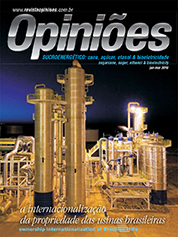Jairo Menesis Balbo
Industrial Director of the Balbo Group
Op-AA-23
The discovery of Brazil
After almost 500 years, Brazil reaps the fruit of its first economic cycle, the one that inaugurated economies of scale in the world, making access to sugarcane economically affordable to everyone. From the pages of testaments of well-off families to drugstore flasks, sugar started being distributed in bulk to all markets, soon fol-lowed by the most commonly known derivative products.
Nowadays, hundreds of sub-products result more from Brazilian competence and talent in developing adequate technology than from production volume. Nowhere in the world is there a better scenario to awaken interests of all nations – after all, nobody lives without energy. In addition, and to an increasing extent, nobody lives without alternative energy.
This is precisely what we extract from the sugarcane plantations, the cleanest, cheapest and renewable energy when it is produced here. In the 16th Century, sugarcane moved the axis of the most modern trade route of that time from the Orient to Brazil. In the early years of the 21st Century this same plant – unbelievably – is the raw material capable of replacing – through the chemistry of ethanol and sugar – what appeared to be the steadfast dependency on oil and its sub-products.
Imagine humanity tied exclusively to fossil sources, finite and increasingly costly, to meet the needs for survival. Ethanol is not going to assume this role of exclusiveness in the market, but it shows that it is here to contribute to the global energy matrix, with its characteristics of renewability, decreasing costs and as a major generator of increasingly qualified jobs.
Knowledge about these value-aggregating proprieties of sugarcane lies at the root of our companies. It is also one of the determinant factors that have made us experience more than sixty years of activities, now in the hands of the third generation, while still preserving its originating characteristics. It is this perseverance that translates into the group’s soundness, which bears in it the awareness that when someone eats an apple, someone planted the apple tree, as we learnt from pioneer Attílio Balbo.
This permanent consolidation is complemented by our participation in Copersucar, truly a coexistence of companies and entrepreneurs seeking efficacy and the best standards in management and production. We are a family-run business that became a global reference in the quest and quality for all products and sub-products derived from sugarcane, because we respect Nature where sugarcane is grown and this raw material’s unique diversity.
This dedication, based on the investment in technology, allows us to produce sugar and ethanol on a large scale, but, more importantly, to conquer market niches with important derivative products, such as our pioneership in the cogeneration of electric power from bagasse; organic sugar and ethanol; biodegradable plastic; sugarcane wax; yeast with high protein content.
Each is a vertex of multifold opportunities to make use of sugar-cane. Our companies’ strategic planning signals that in the short term they will account for half their revenues. This diversification is a great attraction, but can only be achieved through investment, first, in worker education, in his/her improvement and, finally, in technology that derives from this philosophy.
We need not worry about the influx of foreign capital interested in participating in the sugarcane industry’s growth. The possible collapse of the U.S. barrier against ethanol from Brazil may even accelerate the pace of such investments. But, regardless of speed, the concept that will prevail is the one anchored in the principle that we have much more than ethanol to offer.
It is only natural that internationalization take place, and, furthermore, that it be the reason of pride for Brazilians. Foreigners are here to invest in the country that has the most advanced production technology for clean energy and for sub-products of natural origin. We, of this industry, have always known of and publicized this national privilege, but it seems the world heard of it and understood it before we did.
It took the coming of a U.S. president to Brazil to announce that the solution was here, in order for the eyes of the world to look beyond the war-torn wells of the Middle East and rest their sights on the green fields of this place. Since we have the technology, the raw material is more productive here than there, which is why we need not fear the competition.
Like sugarcane and Nature, the Earth is not an asset of everybody, but rather for everybody. We do not care about size, but rather about competence, of which we have enough, thanks to all these years investing with an entrepreneurial vision. The consolidation of companies in the industry owes a lot to this vision.
Were we not in this pioneer position, perhaps we would not even have been consulted. That is why we welcome the entry of new partners from other countries. After all, if we advocate free and open initiative for all, we need not be biased as concerns origin. How should one deny the audacity of the Cosan Group and Shell, merging to better distribute ethanol fuel to all continents?
Thus, foreign capital combines with Brazilian capital to interlink their missions of producing and distributing what is the most state-of-the-art for consumers. It is a two-way effort, but when it gets to Brazil foreign capital will find that we are a step ahead: apart from attracting it, what we want even more is to conquer new markets for what we know how to do. We know that our industry does much more than just products “made in Brazil”. What we do are products “made by Brazil”. This is the “brand” of our ethanol and its derivative products.




